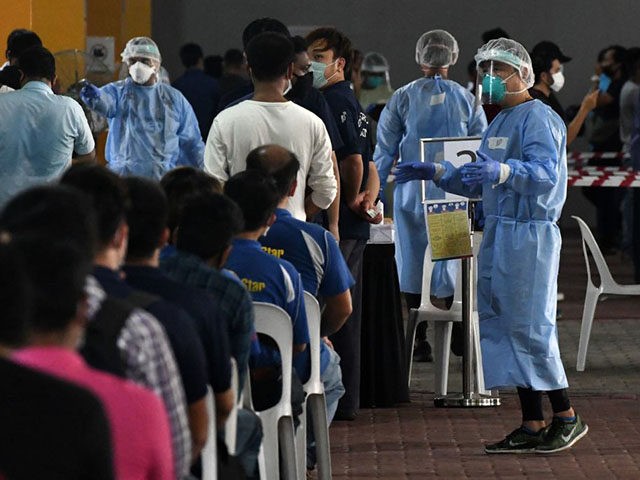The Singapore Ministry of Health announced Tuesday that only individuals who have received the coronavirus vaccine products developed by American companies Pfizer and Moderna will count towards official national vaccination statistics, excluding those who received Chinese-made products.
The Chinese Communist Party has approved five vaccine products for use within the country. Abroad, it has focused on promoting two of them: the vaccine candidate developed by the firm Sinovac Biotech and its competitor from Sinopharm. Sinovac’s “Coronavac” has received significant international scrutiny over its apparently low rate of success in preventing coronavirus infections, as observed through large coronavirus outbreaks in countries that have relied on it as its main inoculation product.
Both the vaccines by Pfizer and Moderna tested at upwards of 94-percent effectiveness in clinical trials in preventing coronavirus infections following the administration of two doses. In contrast, “Coronavac” tested at 50.38 efficacy, just barely passing the 50-percent threshold typically considered the standard to declare a vaccine candidate effective. Sinovac CEO Yin Weidong later claimed the vaccine was “80-90 percent” effective but never offered evidence or cited a study from which that number emerged.
The Sinopharm coronavirus vaccine tested at 79-percent efficacy against only symptomatic coronavirus infections — not counting asymptomatic spread — according to the World Health Organization (W.H.O.).
“The national vaccination numbers reflect only those vaccinated under the national vaccination programme,” the Singapore Ministry of Health asserted Tuesday, according to the country’s Straits Times. “Currently, this only includes those vaccinated with the Moderna Covid-19 [Chinese coronavirus] and Pfizer-BioNTech/Comirnaty vaccines.”
Singapore is only officially using the Pfizer and Moderna products, which use unprecedented mRNA technology to create antibodies against the Chinese coronavirus, in its immunization campaign. The Sinovac product is in small-scale circulation, mostly for those allergic to the available options. The policy will affect those coming from abroad having received other vaccine products not approved in the country, however, such as the Chinese vaccines and the controversial Russian product “Sputnik V.”
Over 17,000 people have received doses of the Sinovac product in the country as of this week, even though it has not been authorized for widespread use there yet. Authorities have largely preserved its Sinovac stock for individuals who suffer an adverse reaction to the first dose of either the Pfizer or Moderna vaccines. Sinovac Biotech has not at press time complied with a request from the Singapore Health Ministry for more test data on its coronavirus inoculation, according to the Straits Times.
The Straits Times reported last week that Singapore government officials have contacted “about 3,600 people who were allergic to the first dose of the mRNA [Pfizer and Moderna] … and more than 1,400 have indicated interest in the programme.”
Conversely, individuals who received Sinovac’s product abroad would still be eligible to receive full inoculations with the Pfizer or Moderna products in Singapore, meaning the government would treat them as unvaccinated. Ministry of Health director of medical services, Kenneth Mak, told reporters Wednesday that Singapore’s government could not vouch for the safety of mixing vaccine products.
“We have not stopped them although data is still lacking considering what the effectiveness is of this strategy using two different vaccines — we call this a heterologous vaccination strategy,” Mak said. “If there are those who are eligible to receive the vaccination from the national vaccination programme, we will allow them to register but we will advise them about the fact that evidence is not available concerning how well the response (is) if they had received other vaccines before.”
The Health Ministry noted this week that the National Immunization Registry does keep records of who receives vaccine candidates that the government approved aside from the American products, but did not clarify if this record was enough to consider the affected individuals fully vaccinated and, thus, not subject to any potential limitations on their freedoms as part of the country’s efforts to contain the pandemic.
Singapore has one of the lowest Chinese coronavirus infection and death rates in the world. As of Wednesday, the government has documented 62,640 cases of coronavirus on the island nation and only 36 deaths. About 65 percent of Singaporeans have received at least one dose of a coronavirus vaccine, according to Yahoo News Singapore.
Singapore’s decision not to officially count Sinovac customers as vaccinated against coronavirus is the latest blow to the company, which has seen its product become increasingly popular in the developing world, but the vaccine candidate’s use precede large coronavirus outbreaks. Among the two most prominent examples are those of Seychelles and Chile, two nations that received international acclaim for their rapid rates of administration of coronavirus vaccines. Their reliance on the Chinese-made products, some experts have suggested, may be to blame for the fact that both countries experienced large surges of coronavirus cases occurring as the number of vaccinations rose.
Chinese officials have admitted the poor quality of Chinese-made coronavirus vaccine candidates. The head of the Chinese Center for Disease Control (CDC), Gao Fu, admitted in April that the Chinese products “don’t have very high protection rates.” He later insisted his comment was a “misunderstanding” and that he was merely encouraging Chinese companies to pursue the mRNA technology used by the American vaccines.
Sinovac Biotech itself has suggested that its product may work better if patients receive a third dose.
The Chinese vaccines’ failures have not stopped the Communist Party from continuing to promote them. On Tuesday, the Chinese government propaganda newspaper Global Times reported that Chinese companies are inking deals with several African countries to manufacture their products on the continent. Morocco recently signed a deal to domestically manufacture the Sinopharm product this week; Egypt has produced at least 1 million doses of Sinovac’s “Coronavac” at press time.

COMMENTS
Please let us know if you're having issues with commenting.